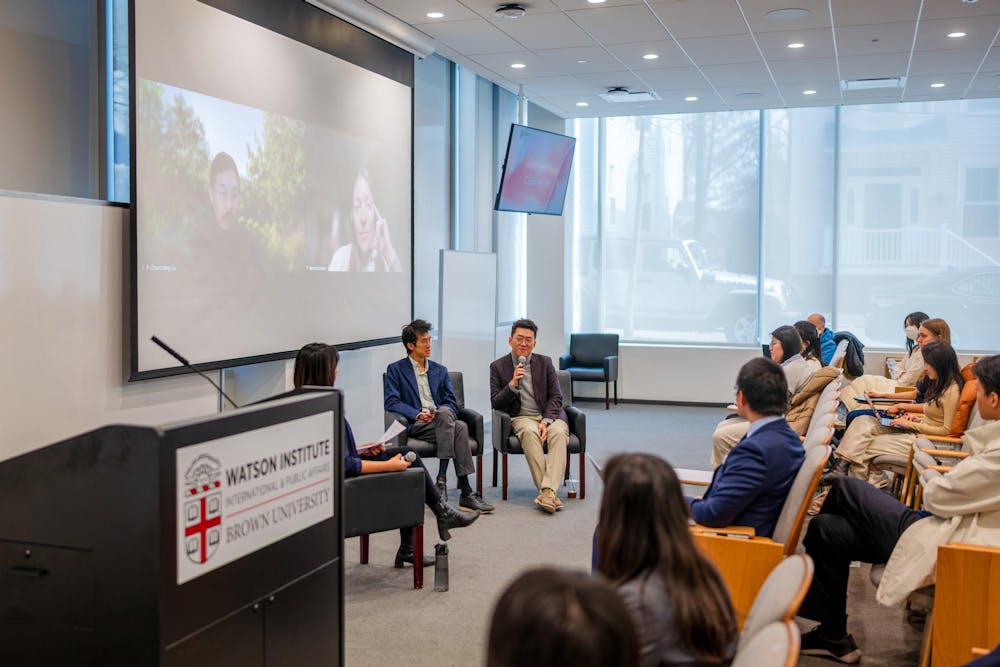The annual Brown China Summit — a student-led conference where leaders and scholars from different fields discuss Chinese politics and culture — took place in Stephen Robert ’62 Hall this weekend.
The theme of this year’s summit was “Silk Roads and Cyber Paths.” It aimed to explore “the intersection of tradition and modernity in shaping China’s global influence,” according to the event’s signup form. The summit featured five panels covering technology, humanities, international relations, finance and real estate.
Opening remarks by the Chairman of the Hong Kong Institution for International Finance Xiao Geng on Saturday was followed by panels on artificial intelligence, religion and geopolitics.
Two panels on Sunday, which focused on finance and real estate, were titled “The ‘Trill-Yuan’ Question: Can China’s Financial Markets Fuel Its Next Era of Growth?” and “Built on Borrowed Time: China’s Real Estate Crisis at an Economic Crossroads.”
“I think the most important thing right now is for people to be informed, which is missing in a lot of media and governmental discussions,” said Emma Brignall ’27, one of the summit’s organizers and religion panel directors. “I think these kinds of forums where people can come together and really hear a discussion is really useful.”
Sunday’s keynote speaker was Susan Thornton, the acting assistant secretary of state for East Asian and Pacific affairs during the first Trump administration. During her talk, Thornton described how U.S.-China relations have evolved over the past few decades.
Chinese military expansion and leadership changes have prompted a “more assertive” approach to foreign policy, while the U.S. has grown increasingly “insecure,” Thorton said.
“We saw after 9/11, especially in 2001 and the subsequent Global War on Terror (as well as) the financial crisis, (that) there were a lot of hits to America’s self confidence at the same time that China’s confidence was rising,” Thornton said.
She described the COVID-19 pandemic as a “fundamental pivot point in U.S.-China relations.”
On Jan. 15, 2020, President Trump signed a trade agreement with China that aimed to repair trade relations. The deal, which is commonly referred to as the “Phase One” agreement, was one that the public believed “could be positive,” according to Thornton.
Just eight days later, on Jan. 23, China placed the city of Wuhan on lockdown to limit the spread of COVID-19.
After the subsequent outbreak of COVID-19 in the United States, “things went off the rails between the US and China,” Thornton said.
While the two countries have many “long-standing differences,” the “areas for common interest are actually increasing,” including the need to address globalization and climate change, according to Thornton.
“We really need to have these two major powers working together on a lot of these challenges, despite their differences,” she said.
Sunday’s panel on financial markets featured three panelists: Stanford finance professor Zhiguo He, investment banking director Neo Wang and asset management director Liqian Ren. The discussion was moderated by Mathias Larsen, a postdoctoral fellow at the Watson Institute for International and Public Affairs.
Panelists discussed the future of China’s financial markets, with a particular focus on the stock market and investment opportunities.
All three panelists agreed that Hong Kong will play an important role in the future of Chinese markets.
According to He, Hong Kong “is not replaceable for China’s big agenda.” Ren added that Hong Kong will remain a “gateway of capital into and out of China.”
“Hong Kong will continue to be a very important financial center for China, mainly because for financial markets, you need the legal system” to help facilitate international trade, Ren said. “No place offers as much as what Hong Kong offers.”
Yale sophomore Benjamin Nuland, who attended the summit, expressed an appreciation for the discourse that the event provided.
Nuland highlighted an “imbalance” in knowledge between Chinese and American students about their counterpart’s country since the number of American students studying in China is significantly lower than the number of Chinese students studying in the United States.
“I think dialogues like these are very important because it gives you a real picture of China and perhaps makes people less concerned about potentially going to China and learning a little bit more about Chinese political strategies,” he said in an interview with The Herald.
“Just hearing respectful conversations about this kind of topic is something we need more of these days,” Brignall said.

Aniyah Nelson is a University News editor overseeing the undergraduate student life beat. She is a senior from Cleveland, Ohio concentrating in Political Science and Sociology. In her free time, she enjoys listening to music and watching bloopers from The Office.





